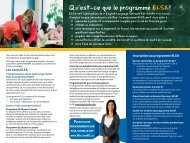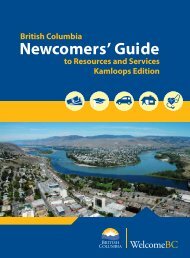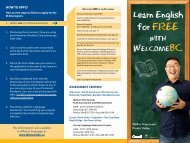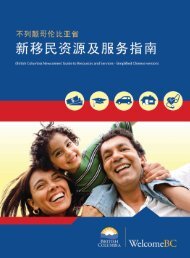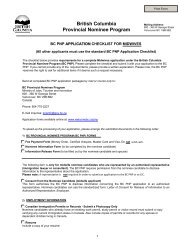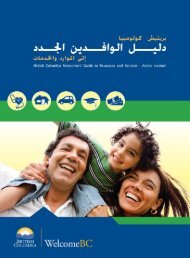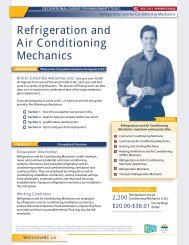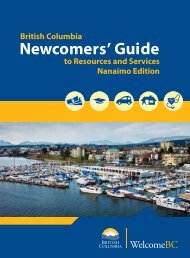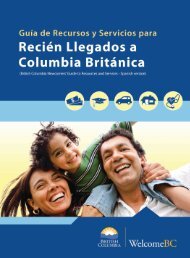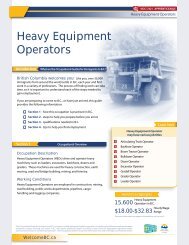Podiatrists - WelcomeBC
Podiatrists - WelcomeBC
Podiatrists - WelcomeBC
- No tags were found...
Create successful ePaper yourself
Turn your PDF publications into a flip-book with our unique Google optimized e-Paper software.
Occupational Guides for Immigrants to B.C.<br />
NOC: 3123<br />
REGULATED<br />
<strong>Podiatrists</strong><br />
<strong>Podiatrists</strong><br />
Introduction<br />
What are the Occupational Guides for Immigrants to B.C.<br />
British Columbia welcomes you! Like you, over 35,000<br />
immigrants from around the world settle in B.C. each year and find<br />
work in a variety of professions. The process of finding work can take<br />
time, so it is important to understand each of the steps needed to<br />
gain employment.<br />
If you are preparing to come to B.C., or have just arrived, this guide<br />
provides the following information:<br />
Section 1<br />
Section 1 - how this occupation is practiced in B.C.<br />
Section 2 - steps to help you prepare before you arrive<br />
Section 3 - qualifications needed in B.C.<br />
Section 4 - tips to help you find employment<br />
Occupational Overview<br />
Occupation Description<br />
<strong>Podiatrists</strong> diagnose diseases, deformities, and injuries of the<br />
human foot and treat patients using braces, casts, shields,<br />
orthotic devices, physical therapy, and subcutaneous soft-tissue<br />
foot surgery.<br />
Learn More<br />
<strong>Podiatrists</strong> may have various job titles<br />
Chiropodist<br />
Doctor of Podiatric Medicine (D.P.M.)<br />
Foot Doctor<br />
Working Conditions<br />
<strong>Podiatrists</strong> work in private practices, clinics and hospitals.<br />
Workforce Highlights<br />
100 <strong>Podiatrists</strong> in B.C.<br />
$20.00-$51.00<br />
Hourly Wage<br />
Range<br />
For more information on wages and workforce see Section 2.<br />
This Occupational Guide for Immigrants to B.C. is a resource to help immigrants build a career plan. Occupational qualifications and requirements<br />
sometimes change. Planning your career in B.C. will require additional research and direct contact with the appropriate regulatory bodies,<br />
professional associations and training institutions. This Occupational Guide is for general information only and is not legal or professional advice.<br />
<strong>WelcomeBC</strong>.ca
Occupational Guides for Immigrants to B.C.<br />
NOC: 3123<br />
REGULATED<br />
<strong>Podiatrists</strong><br />
Section 2<br />
Prepare Before You Come to B.C.<br />
Explore Regions in B.C. to Live and Work<br />
The demand for each occupation varies throughout the regions of the<br />
province. B.C. is a big province, about the same size as Tanzania or<br />
Venezuela, and bigger than Pakistan or Turkey. Each region has different<br />
employment needs and industries. Use the labour market information<br />
and resources in this guide to explore regional employment options.<br />
B.C. Labour Market Information<br />
To learn more about your chosen profession visit the following websites<br />
where you will find information including salaries, regional employment<br />
opportunities, and job descriptions.<br />
B.C. Job Trend Tracker<br />
www.bcjobtrendtracker.ca<br />
Education Planner<br />
www.educationplanner.ca<br />
WorkBC<br />
www.workbc.ca<br />
Working in Canada Tool<br />
www.workingincanada.gc.ca<br />
6<br />
7<br />
8<br />
5<br />
BC Wage and Salary Survey 2009<br />
www.bcstats.gov.bc.ca/StatisticsBySubject/LabourIncome/Earnings.aspx<br />
1<br />
2<br />
3<br />
4<br />
Prepare Yourself<br />
Plan and prepare for your career as much as possible before<br />
arriving in B.C. Be sure you understand the provincial job<br />
market and professional requirements of your occupation. You<br />
may be able to start or complete many of these tasks before you<br />
arrive in Canada.<br />
B.C. DEVELOPMENT REGIONS<br />
1. Vancouver Island/Coast 5. Cariboo<br />
2. Mainland/Southwest 6. North Coast<br />
3. Thompson-Okanagan 7. Nechako<br />
4. Kootenay<br />
8. Northeast<br />
Get Started!<br />
1. Learn about the occupation. Know the name of the job in Canada, and make lists of potential employers.<br />
2. Collect documents. Collect copies of relevant documents, and if necessary, have them translated into English.<br />
Degrees, diplomas or certificates from universities, colleges or schools<br />
Program descriptions related to your studies, and transcripts of grades<br />
Reference letters and performance reviews from employers<br />
Work descriptions and letters from professional agencies<br />
3. Improve your workplace skills. You may need to improve your skills or knowledge before you start working in B.C.<br />
Explore all the resources provided in this guide.<br />
2
Occupational Guides for Immigrants to B.C.<br />
NOC: 3123<br />
REGULATED<br />
<strong>Podiatrists</strong><br />
Essential Skills<br />
Essential skills are the basic workplace abilities you need to<br />
succeed on the job. The most important essential skills for<br />
<strong>Podiatrists</strong> are: continuous learning, oral communication,<br />
and critical thinking. The resources below can help you<br />
assess and upgrade your essential skills.<br />
Essential Skills in the Workplace<br />
www.itsessential.ca<br />
How Do Your Skills Measure Up<br />
measureup.towes.com/default.asp<br />
Test of Workplace Essential Skills<br />
www.towes.com<br />
English Language Requirements<br />
Although there is no formal English language prerequisite to being a Podiatrist, you will need to<br />
have advanced skills in listening and speaking to communicate with your clients, co-workers and<br />
employer. You must be able to understand technical documents and write reports in English.<br />
You should have reached a minimum English proficiency level of CLB 8 (Canadian Language<br />
Benchmarks: www.language.ca).<br />
You may need to enroll in training or upgrading programs. Training programs for <strong>Podiatrists</strong><br />
have language level requirements which may vary in the types of tests they accept and the<br />
minimum scores required. Enrollment in a doctoral program at the University of British<br />
Columbia requires a TOEFL IBT score of 88 (PBT 550), an IELTS score of 6.5, or Cambridge CAE<br />
at level C. The following website can help you to explore various training facilities and their<br />
entrance requirements: www.educationplanner.ca.<br />
Improve Your Language Skills<br />
Continue improving your language skills by taking further English and Canadian cultural training, joining organizations,<br />
getting involved in different community groups, and attending events where English is the primary language spoken. The<br />
more skills, certification, and languages you have, the more attractive you are to a potential employer.<br />
English Language and Communication Services<br />
DIVERSEcity<br />
www.dcrs.ca<br />
English Language Services for Adults<br />
www.elsanet.org<br />
Planning to Work in British Columbia,<br />
Canada Workbook<br />
www.welcomebc.ca/local/wbc/docs/<br />
BC_Workbook_EN_June4_Fillable.pdf<br />
IELTS International English<br />
Language Testing System<br />
www.ielts.org<br />
Immigrant Services Society of BC<br />
www.issbc.org<br />
MOSAIC<br />
www.mosaicbc.com<br />
S.U.C.C.E.S.S.<br />
www.successbc.ca<br />
TOEFL<br />
www.toefl.org<br />
Welcome BC<br />
www.welcomebc.ca<br />
3
Occupational Guides for Immigrants to B.C.<br />
NOC: 3123<br />
REGULATED<br />
<strong>Podiatrists</strong><br />
Section 3<br />
Qualifications<br />
The following information will help you understand how to<br />
become qualified to work in your profession in B.C. This is<br />
only a guide; you should do more research to make a career<br />
plan that will work for you.<br />
The College of Podiatric Surgeons of British Columbia<br />
regulates the practice of podiatry in B.C. by setting education<br />
and competency requirements, practice guidelines and<br />
standards of practice, and by monitoring and enforcing these<br />
requirements and standards.<br />
Licensing and registration with the College of Podiatric<br />
Surgeons of British Columbia is required in order to legally<br />
practice as a Podiatrist in the province.<br />
A doctoral degree in podiatry is required in order to practice<br />
podiatry, and use the designation Doctor of Podiatric<br />
Medicine (D.P.M.).<br />
Podiatrist Qualifications<br />
Getting a licence in B.C. is a multi-step process. To obtain<br />
a professional designation that allows you to be licensed<br />
and registered to practice podiatry, you are required to<br />
demonstrate completion of a doctoral degree program in<br />
podiatric medicine. A medical residency is required in British<br />
Columbia.<br />
Internationally Trained Professionals<br />
For an assessment of international credentials and<br />
qualifications prior to your arrival in B.C., contact the<br />
Canadian Information Centre for International Credentials.<br />
Their evaluation services offer expert advice on how<br />
qualifications obtained abroad compare with credentials<br />
obtained in a Canadian province or territory, however<br />
the evaluation is advisory only and does not guarantee<br />
recognition of your qualifications for employment or<br />
certification purposes in Canada. Please note that they<br />
charge a fee for their services. For detailed information,<br />
visit: www.cicic.ca.<br />
British Columbia Podiatric Medicine<br />
Association (BCPMA)<br />
foothealth.ca<br />
College of Podiatric Surgeons of British<br />
Columbia<br />
bcpodiatrists.org<br />
Learn More<br />
Important Links for <strong>Podiatrists</strong> in B.C.<br />
4
Occupational Guides for Immigrants to B.C.<br />
NOC: 3123<br />
REGULATED<br />
<strong>Podiatrists</strong><br />
Section 4<br />
Tips to Finding Employment in B.C.<br />
Get Help with Your Job Search<br />
Finding a job in B.C. may be very different than in your home country.<br />
You may need help finding job vacancies, updating your resume,<br />
writing cover letters, preparing for interviews, and understanding<br />
what B.C. employers are looking for.<br />
Skills Connect for Immigrants program provide<br />
employment-related support services that move<br />
internationally educated professionals into the B.C. labour<br />
market: www.welcomebc.ca/skillsconnect<br />
B.C. Employment and Labour Market Services employment<br />
programs: www.labourmarketservices.gov.bc.ca<br />
!<br />
Employers want experienced workers. Even with<br />
the right certification and years of experience in your<br />
country, many employers may want you to start in an<br />
entry-level job to show your skills before you work in<br />
your chosen profession.<br />
Industry Links<br />
These industry organizations provide important information<br />
and offer key resources:<br />
Canadian Podiatric Medical Association (CPMA)<br />
www.podiatrycanada.org<br />
Society of Chiropodists and <strong>Podiatrists</strong><br />
www.feetforlife.org<br />
!<br />
Look for jobs in the classified sections of newspapers, or<br />
use on-line resources like:<br />
CraigsList<br />
geo.craigslist.org/iso/ca/bc<br />
B.C. Jobs<br />
www.bcjobs.ca<br />
!<br />
The Canadian government provides employment and settlement services in China, India, the Philippines and the United<br />
Kingdom. The program is called the Canadian Immigrant Integration Program. More information about these pre-arrival<br />
services: www.newcomersuccess.ca<br />
Build Connections Within Your Profession<br />
Many job vacancies are not advertised. Get advice from people you may know in B.C., including relatives, friends or<br />
neighbours. Working as a volunteer, attending events, and joining clubs and associations are good ways to meet<br />
people, learn about Canadian workplace culture and improve your English language and communication skills.<br />
You may benefit from joining local Chambers of Commerce and business clubs, attending business functions, and<br />
meeting with unions, contractors, employment agencies, and recruitment specialists. For more information<br />
see: www.bcchamber.org<br />
<strong>WelcomeBC</strong>.ca<br />
This project is made possible through funding from<br />
the Government of Canada with support from the Province of British Columbia. Updated December 4, 2012 5<br />
The National Occupational Classification (NOC) is used in Canada to classify jobs by industry and level of education. If you<br />
are applying for an immigration program in Canada, you will need to know the NOC code for your occupation. The NOC<br />
Code for Podiatrist is 3123. To learn more about NOC 3123, visit www5.hrsdc.gc.ca/NOC/English/NOC/2011/QuickSearch.<br />
aspxval65=3125


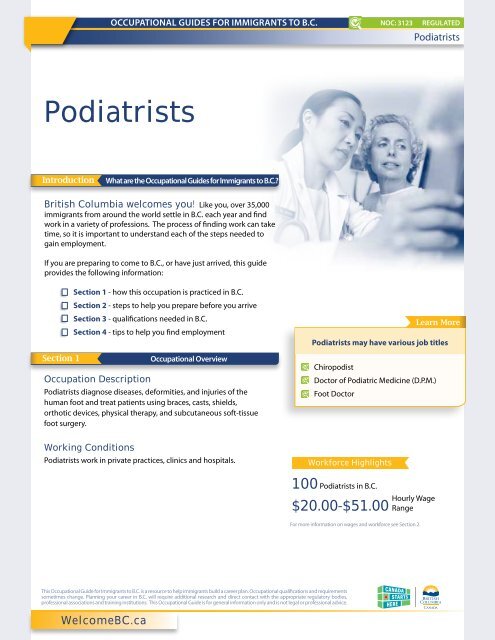
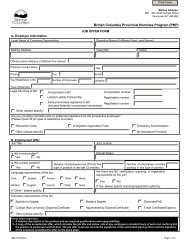
![Medical Radiation Technologists [MRT] - WelcomeBC](https://img.yumpu.com/50071314/1/190x245/medical-radiation-technologists-mrt-welcomebc.jpg?quality=85)
